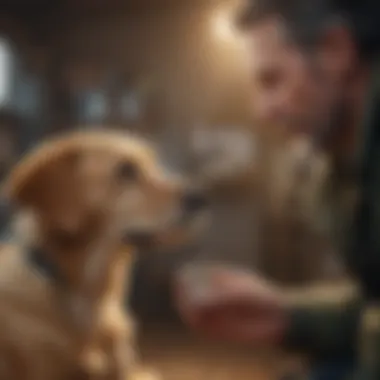Where Dogs Get Their Rabies Shots: A Complete Guide


Intro
Vaccination is a critical aspect of pet ownership, especially when it comes to preventing deadly diseases like rabies. Understanding where dogs get their rabies shot is essential for responsible pet owners. Rabies is a viral disease that poses a significant risk not only to dogs but also to humans. In this part of the guide, we will explore various locations and methods for rabies vaccination, the importance of these vaccinations, and factors such as costs and schedules.
Importance of Rabies Vaccination
Rabies vaccinations are vital for a variety of reasons. Firstly, rabies is almost always fatal once symptoms appear. Vaccinating dogs can prevent the disease from spreading within the pet population and to humans. In many regions, rabies vaccination is not just advisable; it's mandated by law. Failure to vaccinate can lead to legal consequences, including fines and increased liability in the event of a bite.
Common Locations for Rabies Vaccinations
Pet owners can access rabies vaccinations in several types of facilities:
- Veterinary Clinics: Most pet owners choose to have their dogs vaccinated at local veterinary clinics. Licensed veterinarians administer the vaccine, ensuring safe and effective procedures. Clinics often have the necessary follow-up support for vaccine reactions.
- Animal Shelters and Rescue Organizations: Many shelters offer vaccination services, often partnering with local veterinarians. These services can sometimes be less expensive than private clinics, making them accessible for low-income families.
- Mobile Vaccination Clinics: Some regions have mobile clinics that travel to different neighborhoods. These clinics provide convenience as they operate in areas that may not have easy access to veterinary services.
- Community Events: In some areas, local governments or pet organizations hold vaccination events. These events often provide low-cost or even free rabies vaccinations.
Considerations for Pet Owners
When deciding where to get a rabies shot for a dog, pet owners should consider several factors:
- Costs: Prices can vary significantly between clinics, shelters, and events. Some facilities may offer vaccination at reduced rates.
- Legal Requirements: Familiarize yourself with local laws regarding rabies vaccination. Some states have specific timelines for when the first vaccine should be administered and how often it must be renewed.
- Health Condition of Dog: It’s essential to ensure that the dog is healthy before vaccination. Consulting with a veterinarian is a good practice.
"Keeping up-to-date with rabies vaccinations not only protects your dog but also the community."
Vaccination Schedule
The initial rabies vaccination is typically given to puppies at around 12 to 16 weeks of age. After this first vaccination, the dog will need a booster shot. Many institutions recommend a booster every one to three years, depending on the type of vaccine used. Always confirm vaccination schedules with a veterinarian to ensure compliance with local regulations and the health of your dog.
Preface to Rabies Vaccination
Rabies vaccination is crucial in safeguarding both animal and human health. It is not just a routine procedure for dogs; it serves as a fundamental aspect of public health management. By taking the time to understand the landscape of rabies vaccinations, pet owners can make educated choices for their animals, potentially averting devastating consequences that rabies can instigate.
Understanding Rabies
Rabies is a viral disease that affects the central nervous system, often leading to death once clinical symptoms appear. This virus typically spreads through saliva, usually via bites from infected animals. Dogs, being social creatures, can encounter wild animals that carry rabies, making vaccination even more critical. Awareness of rabies includes recognizing its symptoms, understanding how it spreads, and knowing the species that are commonly responsible for transmission, such as bats, raccoons, and skunks.
The incubation period for rabies can vary widely; however, it generally lasts between one to three months. In some cases, it can extend to a year. Unvaccinated animals that contract rabies can exhibit various signs like aggression, disorientation, or excessive salivation. It is essential for dog owners to be vigilant and proactive about vaccinations since rabies poses serious threats not only to their pets but also to the community at large.
Importance of Vaccination
The significance of rabies vaccinations cannot be overstated. Vaccination serves as the most effective means of preventing the rabies virus from establishing itself in a dog. By vaccinating their pets, owners create a barrier against the disease, thus protecting their own dogs and those they interact with.
Furthermore, most states have laws mandating rabies vaccination for dogs. This is not simply a bureaucratic formality; it plays a pivotal role in public health. Vaccination helps to maintain herd immunity within communities, ultimately reducing the likelihood of rabies outbreaks.
The cost of rabies vaccination is comparatively minimal compared to the potential veterinary expenses and legal liabilities that could arise from an unvaccinated dog transmitting rabies. In summary, understanding rabies and the significance of vaccination is critical. It fosters responsible pet ownership and ensures compliance with local laws while protecting the broader community.
Common Locations for Rabies Shots
Understanding the common locations for administering rabies shots is essential for dog owners. This knowledge not only informs pet owners about their options but also highlights the vital role that these establishments play in public health. Rabies vaccination is not just a pet responsibility; it is a community health imperative. Choice of location can affect the convenience, cost, and overall experience of the vaccination process. By being aware of where these shots can be obtained, owners can make informed decisions that enhance their dog’s well-being.


Veterinary Clinics
Veterinary clinics are the most common place for dogs to receive rabies vaccinations. These clinics typically offer accessible services ranging from routine check-ups to emergency care. The staff at veterinary clinics are trained professionals who understand the specific needs of dogs. They ensure that each vaccination is administered safely and effectively. Additionally, maintaining an ongoing relationship with a veterinary clinic can help monitor your pet's health over time.
When considering a veterinary clinic for vaccinations, it is important to check the clinic's credentials and reviews. Some clinics may offer discounts for vaccinations during certain events or times of year. This can help in reducing costs, making it easier for dog owners to keep their pets up to date with vaccinations.
Animal Hospitals
Animal hospitals serve as a more comprehensive option than standard clinics. They often provide advanced care and have more specialized facilities. Many animal hospitals have emergency services and are equipped to handle severe health issues that may arise during or after vaccination.
While animal hospitals generally charge more than standard veterinary clinics, they offer detailed health assessments, which can be beneficial. Owners can ensure that their dogs not only receive vaccinations but also undergo capable health evaluations. If a dog has specific health concerns, the hospital setting provides the advantage of having various specialists available.
Mobile Clinics
Mobile clinics are an innovative solution that brings vaccination services directly to neighborhoods. These clinics are convenient for pet owners with limited mobility or those living in remote areas. Mobile clinics often operate on a scheduled basis, visiting specific locations on certain days. This service can be especially appealing for those who may find it difficult to transport their pets to a traditional clinic.
These clinics usually have well-trained veterinarians and veterinary technicians. They provide a similar level of service to that found in stationary clinics. The reduced stress on the dog made possible through a familiar environment can be significant. Some owners prefer mobile clinics due to their cost-effectiveness, as they may provide lower rates or community-sponsored vaccination events.
Non-Profit Organizations
Some non-profit organizations also offer rabies vaccination clinics. These organizations may host vaccination drives at various locations, often at reduced fees or even for free. They work to promote public health and responsible pet ownership by ensuring pets are vaccinated against rabies.
Using a non-profit organization for vaccinations can be advantageous, particularly for those in low-income situations. Services provided by these organizations help mitigate health risks to pets and the community. Owners should keep an eye out for community events or clinics held by these organizations during local initiatives.
Local Government Facilities
Local government facilities, such as health departments or animal control offices, often provide vaccination services. They may offer low-cost rabies vaccination clinics as part of their public health agenda. This can be an ideal option for pet owners looking to ensure compliance with local laws regarding vaccinations.
Such facilities usually have set schedules for vaccinations, and it is advisable for owners to check their local government websites for updates. Participation in these programs not only helps in vaccinating pets but also supports broader public health goals. By engaging with local government resources, pet owners can be proactive in preventing rabies outbreaks in their communities.
"Vaccination not only protects your dog but also contributes to public health and safety."
In summary, various locations provide rabies vaccinations for dogs, and each has its unique benefits. By choosing the right location based on factors like convenience, cost, and available expertise, pet owners can ensure their dogs are vaccinated and healthy.
Factors Influencing the Choice of Location
Choosing the right location for a rabies vaccination is crucial for dog owners. Several elements must be considered to ensure the best experience for both the pet and the owner. Factors such as proximity to home, cost, and the reputation of the facility play a significant role in this decision-making process. Understanding these elements can help pet owners make an informed choice that promotes their dog's health and well-being.
Proximity to Home
When selecting a place for rabies vaccination, the location's proximity to home is an important aspect. A nearby facility can significantly reduce the stress involved in transporting the dog. Long travel times can make pets anxious, especially if they are not used to car rides. Reducing travel distance ensures a smoother experience for both the owner and the dog. Furthermore, in emergencies where immediate care is necessary, having a trusted location close by is invaluable. Pet owners can visit the clinic quickly, ensuring their dogs receive timely treatment if needed.
Cost of Vaccination
Cost is always a relevant factor when considering rabies vaccinations. Pricing can vary widely depending on the type of facility. Local veterinary clinics might charge more than mobile clinics or community events offered by non-profit organizations. It is advisable for pet owners to get an estimate of the vaccination cost beforehand. Also, some pet insurance plans may cover part of these expenses, making it crucial to verify what costs will be out-of-pocket.
Additionally, while a lower price may be attractive, it should not compromise the quality of care provided. Investing in a reputable facility often pays off in terms of the overall health of the pet and peace of mind for the owner.


Facility Reputation
The reputation of the facility that administers the rabies shot is another critical factor. Pet owners should look for accredited clinics with good reviews. Recommendations from friends, family, or even online forums can be helpful. A facility known for excellent care and customer service will likely provide a more comfortable experience for the dog.
Pet owners can research the staff's qualifications and any certifications held by the facility. Additionally, a well-maintained and clean environment often reflects the overall commitment to animal care. A reputable facility also suggests that the staff is knowledgeable about the latest vaccination protocols and can advise on any post-vaccination care needed.
Choosing the right location for your dog's rabies vaccination can lead to a more positive experience and better health outcomes.
Overall, selecting the right vaccination location requires careful consideration of proximity, cost, and reputation. Each element plays an essential role in ensuring both the pet’s health and the owner’s satisfaction.
Vaccination Process Overview
The vaccination process for dogs, particularly concerning rabies, is a crucial aspect of public health and animal welfare. Understanding this process benefits pet owners, veterinarians, and the broader community. A clear grasp of the steps involved helps ensure that dogs receive their needed protection efficiently and effectively. Each stage of the vaccination process holds significance that impacts not just the dog but also the public's safety and well-being.
Preparation for the Appointment
Preparing for a rabies vaccination appointment involves several practical steps. First, pet owners should ensure that their dog is healthy. Ideally, a quick health check by the owner can help identify any immediate health concerns that may affect vaccination.
Next, it is essential to gather necessary documentation. This includes proof of previous vaccinations, medical history, and identification of the dog. Calling the veterinary clinic in advance can confirm any specific requirements they may have, such as empty stomach requirements for the dog.
Additionally, pet owners should consider making the appointment at a time when their dog is likely to be calm. Limiting stressful situations before the visit can provide a smoother experience for both the dog and the clinic staff.
The Administration of the Shot
During the actual vaccination, the veterinarian will begin by assessing the dog’s overall health. This may involve checking vital signs and observing behavior. Following this, the rabies vaccine is typically administered via injection under the skin or into the muscle, commonly in the rear leg.
The veterinarian will choose the injection site based on the dog’s size and age. The entire process is typically swift, taking only a few moments. After administering the shot, the veterinarian usually keeps the dog under observation for a short period to watch for any immediate adverse reactions. This is a preventive measure to ensure the dog's safety following vaccination.
Post-Vaccination Care
After getting the rabies shot, it’s vital for pet owners to monitor their dog closely. Most dogs may experience mild side effects, like slight lethargy or soreness at the injection site. Owners should provide a comfortable space for their pet to rest.
In the days following the vaccination, watch for any unusual behavior or severe reactions such as excessive swelling, difficulty breathing, or vomiting. If any of these symptoms occur, contacting the veterinarian immediately is vital.
Taking note of when the next vaccination is due is also essential. Keeping a record helps ensure that dogs stay up to date with their vaccinations and comply with legal requirements in many jurisdictions. Sharing any concerns about timing or side effects with the veterinarian during a follow-up appointment can be beneficial.
"Vaccinations protect not only individual pets but also contribute to the health of communities by controlling rabies outbreaks."
Each step of the vaccination process—from preparation to post-care—emphasizes the importance of commitment to responsible pet ownership. Understanding these aspects is essential for maintaining the health of dogs and safeguarding public health.
Legal Requirements and Regulations
Understanding the legal landscape surrounding rabies vaccinations is essential for pet owners, veterinarians, and anyone involved in animal care. Rabies is a fatal virus, and various jurisdictions have established specific mandates regarding the vaccination of pets. These regulations can vary widely, influencing how and when vaccinations are administered.
Each state or locality may have unique laws governing rabies vaccinations. These laws are designed to protect not only the health of dogs but also public health. Knowing the local requirements helps pet owners avoid potential fines or legal issues while ensuring their pets comply with vaccination schedules.
State and Local Laws


State and local laws establish the framework for rabies vaccination requirements. These laws differ by region, but common elements may include the following:
- Mandatory Vaccination: Many areas require that dogs receive their first rabies vaccination by a certain age, often between three to six months.
- Booster Shots: Rabies vaccinations must typically be kept up to date, with booster shots required every one to three years, depending on the vaccine used.
- Licensing Requirements: In some localities, a dog must be vaccinated against rabies to obtain or renew its license. Failing to comply can result in fines or denial of a pet license.
- Reporting Incidents: Some laws require that any suspected rabies exposure or bite from an unvaccinated dog be reported to local health authorities.
Being informed about these laws can lead to timely vaccinations and preventive measures. It ensures pets are protected and aligns with community safety initiatives.
Documentation and Records
Maintaining proper documentation of rabies vaccinations is not just a good practice; it is often mandated by law. Documentation serves as proof that a dog has been vaccinated and can be critical in emergency situations.
The key points about documentation include:
- Vaccination Certificates: After a rabies shot, pet owners should receive a vaccination certificate detailing the date of the vaccine, the type of vaccine used, and the veterinarian who administered it.
- Records of Boosters: Keep records of all subsequent booster shots. These documents are crucial when licensing pets or if any legal concerns arise.
- State-Specific Forms: Some states may require specific forms to be filled out, which may include additional health checks or specific rabies vaccine types.
- Easy Access: Always store these documents in an easily accessible location. In situations where proof of vaccination is urgently needed, such as dog park visits or travel, having quick access can simplify the process.
"Proper documentation can prevent legal issues and ensures your pet's health and compliance with local laws."
In summary, navigating the legal requirements surrounding rabies vaccinations is vital for responsible pet ownership. Understanding both state and local laws, along with the importance of proper documentation, equips pet owners with the knowledge to maintain their pet's health and abide by necessary regulations.
Risks of Not Vaccinating
Neglecting to vaccinate dogs against rabies poses significant risks. It affects not only the health and safety of the dog but also has broader public health implications. The choice of not vaccinating may seem innocuous, but it can lead to dire consequences for both pets and the communities they reside in. Thus, understanding the risks is essential for responsible pet ownership.
Health Risks to the Dog
The most immediate risk to an unvaccinated dog is the heightened susceptibility to rabies. Rabies is a fatal viral disease which affects the nervous system, leading to severe symptoms and ultimately death after infection. Dogs that are exposed to rabies through bites from infected animals or via contact with bat secretions may contract the virus. Symptoms can take weeks to appear but escalate quickly once they start, often resulting in aggressive behavior, paralysis, and death. Furthermore, treating rabies after exposure is difficult and often requires euthanasia of the animal. Vaccination offers a simple and effective way to protect dogs from this deadly disease.
Public Health Concerns
The ramifications of rabies extend beyond the individuals who neglect to vaccinate their pets. Rabies can be transmitted to humans through bites or scratches from infected animals. Each year, thousands of people around the world die from rabies, many of whom were exposed to domestic animals. An unvaccinated dog that interacts with wildlife or other pets raises the risks of disease transmission to humans. It strains public health systems and demands extensive resources for monitoring and controlling rabies outbreaks. Such scenarios reinforce the necessity of adhering to vaccination schedules for the sake of community health.
Legal Consequences
Local laws in many regions mandate rabies vaccinations for dogs, establishing vaccination as a legal requirement. Pet owners who fail to comply with these regulations may face penalties, including fines or legal actions. Some jurisdictions may even impose stricter restrictions on unvaccinated pets, such as mandatory quarantine or seizure. These legal consequences not only highlight the importance of vaccination for individual pets but also serve to protect public health and safety. By vaccinating their dogs, pet owners ensure compliance with the law and contribute to a societal standard that underscores the need for rabies prevention.
"Vaccination against rabies is not just about protecting your pet; it's about safeguarding the well-being of us all."
Understanding the risks associated with not vaccinating dogs can aid pet owners in making informed choices. Protecting dogs against rabies ensures their health, safeguards public health, and complies with legal requirements.
Culmination
In this article, we have explored the various dimensions of rabies vaccinations for dogs, highlighting the significance of throrough vaccination and the available venues for obtaining this crucial health service. It is essential to recognize that vaccinating dogs against rabies is not merely a legal obligation in many areas; it is a significant component of responsible pet ownership. It ensures not only the health and safety of the dog but also the welfare of the community at large.
Key Takeaways
- Understanding Rabies: Rabies poses a serious risk to both pets and humans. The disease, once symptomatic, is almost always fatal.
- Vaccination Locations: Options include veterinary clinics, animal hospitals, mobile clinics, and even local government facilities.
- Factors to Consider: Pet owners must take into account proximity, cost, and the reputation of the facility when choosing where to vaccinate their dogs.
- Legal Compliance: Many regions require dogs to be vaccinated against rabies, with documentation often needed for legal reasons.
In light of this information, the process of vaccinating a dog should be viewed as a fusion of ethical responsibility and practical necessity. Regular vaccinations ensure not only protection but also contribute to public health by preventing potential rabies outbreaks.
Encouraging Responsible Pet Ownership
Being a responsible pet owner goes beyond basic care. It involves proactive measures such as keeping vaccinations up to date, including rabies shots. Owners should actively seek trusted facilities to handle these immunizations. In activities such as community outreach or education on the risks of rabies, the engagement with local organizations can further stimulate responsible practices.
Ultimately, the health of dogs and their capacity to communicate safely with people hinge on these preventive measures. Continuous education about the dangers of rabies and the importance of vaccination plays a critical role in the larger narrative of animal safety and welfare. By understanding where dogs receive their vaccinations, pet owners can confidently take the necessary steps to uphold their responsibilities.







